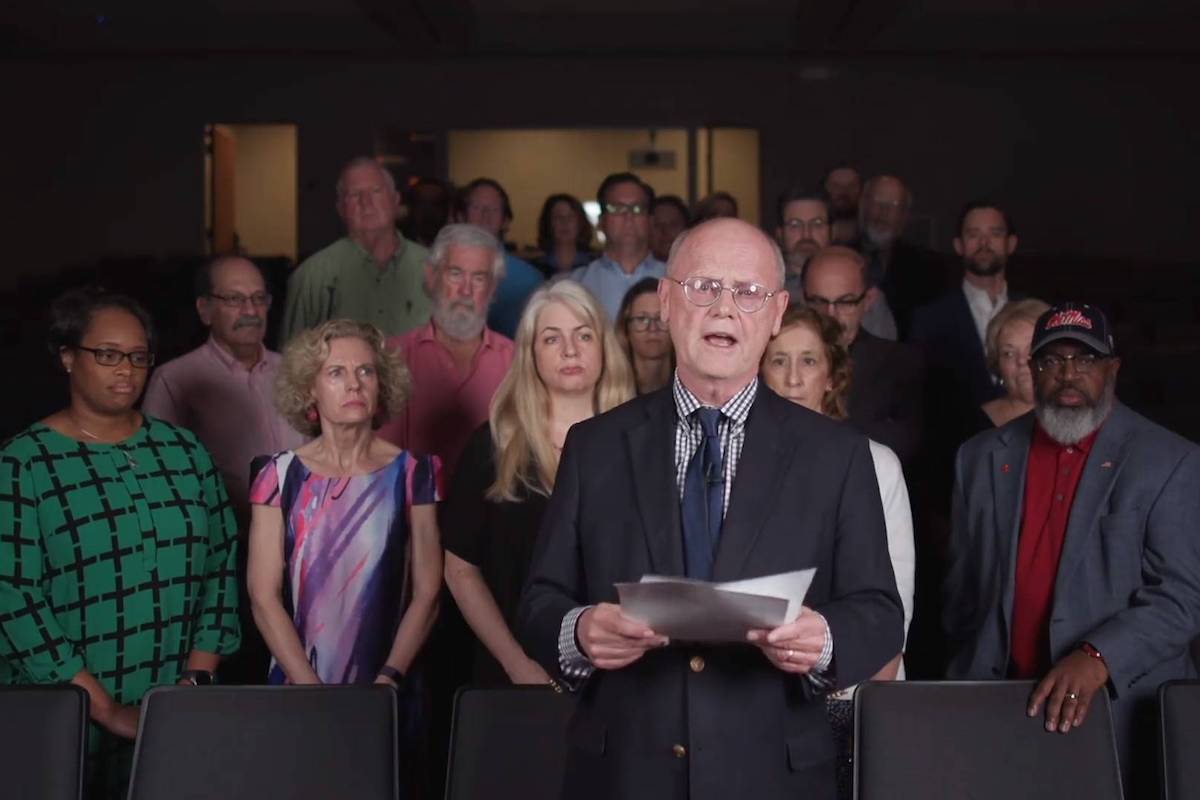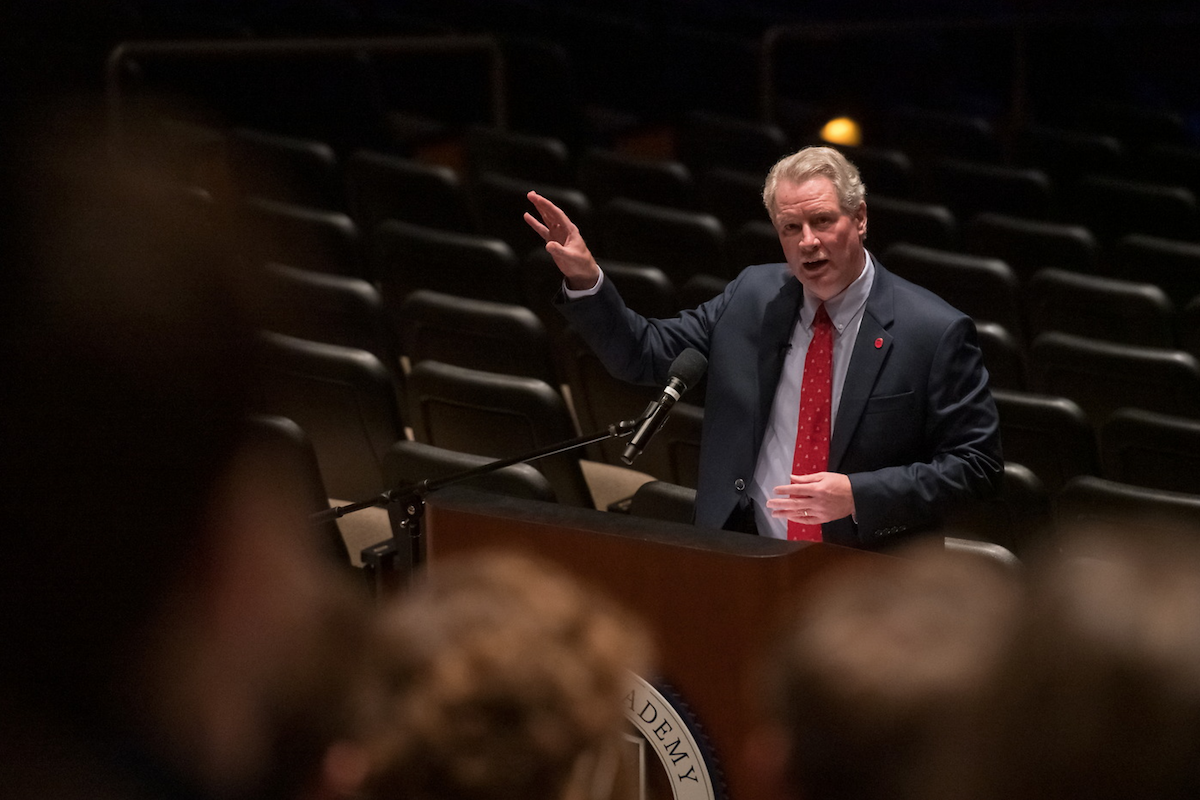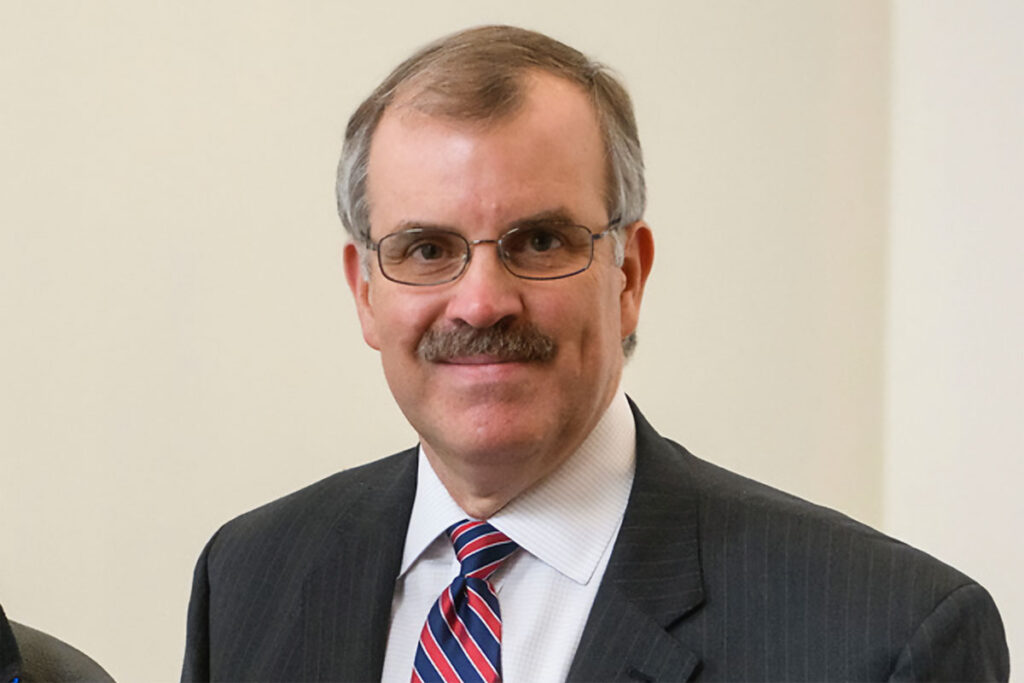UM Awards Ombuds Who Fought to Protect Employees’ Confidentiality After UM Emails Series
By Ashton Pittman, Mississippi Free Press (reposted with permission)
The University of Mississippi awarded Ombudsman Paul Caffera as one of 12 “outstanding staff members” at its May 30, 2023, Staff Appreciation Week Awards Ceremony. He fought the university in a lawsuit between 2020 and 2022 as he sought to maintain the confidentiality of employees who had sought his office’s services. Photo courtesy Ole Miss Digital Imaging Services
The University of Mississippi is honoring Paul Caffera, the ombudsman who fought a two-year legal battle with the university to protect confidential information about employees who sought help from his office.
The University of Mississippi is honoring Paul Caffera, the ombudsman who fought a two-year legal battle with the university to protect confidential information about employees who sought help from his office.
Officials targeted his office in 2020 as part of an effort to uncover the identity of whistleblowers who turned over emails that formed the basis for this publication’s “UM Emails” series.
The University announced on Tuesday that Caffera was among 12 “outstanding staff members” earning an award at the annual Staff Appreciation Week Awards Ceremony for his work in equal employment opportunity services. The award does not mention his past battles with the administration, however.
The UM Ombuds website explains Caffera’s role this way: “The University Ombuds provides the University of Mississippi Community with a confidential, neutral, independent, and informal place to voluntarily seek assistance with bringing forth and resolving campus-related concerns, problems, or disputes. … The purpose of the University Ombuds is to ensure that every voice at the University of Mississippi can be heard, without fear of loss of privacy, retaliation, or retribution.”
The UM Emails Revelations
The Mississippi Free Press published the three-part UM Emails exposé in August 2020, revealing the communications between university officials and donors who expressed racist views or threatened to withhold funding over anti-racism efforts.
The emails showed that, even as former journalism school dean Will Norton publicly condemned former school namesake Ed Meek in 2018 for warning about plummeting real estate values while posting photos of two Black women out in town one night, he courted donations from another donor named Blake Tartt.
 Former UM School of Journalism and New Media Dean Will Norton’s emails were at the center of the UM Emails exposé. He is pictured here in September 2018 when he condemned remarks by former school namesake Ed Meek. Photo courtesy University of Mississippi
Former UM School of Journalism and New Media Dean Will Norton’s emails were at the center of the UM Emails exposé. He is pictured here in September 2018 when he condemned remarks by former school namesake Ed Meek. Photo courtesy University of Mississippi
The emails revealed that Tartt took the photo Meek later posted. Before Meek’s post, Tartt shared the photo with Norton, privately calling the women “African hookers” who were “ruining” Oxford’s culture. “I happen to know what happens when a place is over taken by the wrong elements,” Tartt wrote to Norton in September 2018. Days later, the dean gave a speech calling Meek’s Facebook post “reprehensible.”
Still, while Meek’s name came off the journalism school building, Norton and others continued seeking donations from Tartt while keeping his role in the affair a secret. (Neither Tartt nor Norton ever agreed to interview requests for the UM emails series).
After the whistleblowers obtained the emails in the spring of 2020, which included additional revelations, Norton stepped down from his role as dean at the end of the semester. The Mississippi Free Press published the exposé in August 2020. In response, officials promised to make efforts to change the university’s culture.
‘Our People Go Above And Beyond’
In September 2020, the University of Mississippi Equal Opportunity & Regulatory Compliance Office, which handles Title IX employment issues, began an investigation into the pseudonymous UM Emails whistleblower known only as “Winston Smith” and others involved in obtaining the emails. University of Mississippi Police also opened a criminal probe into the whistleblowers based on allegations of “harassment.”
Caffera participated in two interviews for the EORC’s investigation in the fall of 2020, saying he did not know the identity of the whistleblowers and could not have revealed that information even if he did, nor could he turn over emails or documents to assist in Rowzee’s investigation.

“As chancellor, I believe the success of the university depends on the strength of our people,” University of Mississippi Chancellor Glenn Boyce said in a May 30, 2023, statement for the Staff Appreciation Week Awards Ceremony. “And, here at the University of Mississippi, our people go ‘above and beyond’ and their efforts ripple far and wide.” Photo courtesy Ole Miss Digital Imaging Services
In court documents, the ombudsman cited the 2015 Charter Agreement for the Office of the Ombudsman, which says the ombudsman “shall not testify or provide records to be used in any … investigation” and shall “ensure confidentiality of the visitor’s identity and communications.” The charter also says that the ombudsman “shall be protected from retaliation as a result of his/her role.”
In November 2020, Caffera filed a lawsuit seeking to block the university from accessing his emails and other records because doing so could imperil the confidentiality of university faculty and staff who had sought his services. Faculty who had confided in Caffera about issues on campus told the Mississippi Free Press at the time that they were “terrified” for their jobs. Soon after, in December 2020, Chancellor Glenn Boyce placed Caffera on administrative leave.
Caffera did not return to the position until March 1, 2021, after the EORC investigation failed to uncover the whistleblower’s identity but did find “that the School of Journalism is a hostile work environment within EO/RC’s understanding.” The investigation did not find any ties between the ombudsman and the whistleblowers. Caffera’s efforts to protect employee confidentiality did, however, gain the notice of the International Ombuds Association, which condemned the university’s attempts to obtain information from his office.
After the lawsuit concluded in 2022, the United Campus Workers of Mississippi helped raise funds to pay Caffera’s legal fees and praised his efforts.
“Through his lawsuit, Mr. Caffera prevented an intrusion into faculty email correspondence through injunctive relief. Moreover, he secured for us all a new and firm commitment from the Chancellor to the confidentiality of the Ombuds office,” the union said in a June 2022 blog post, noting that the litigation had left “Mr. Caffera with sizable outstanding legal fees incurred in the defense of the office and in defense of UM employees.”
UM’s awards announcement Tuesday did not mention the lawsuit, however.
“As chancellor, I believe the success of the university depends on the strength of our people,” Boyce said in a statement, speaking generally about the winners. “And, here at the University of Mississippi, our people go ‘above and beyond’ and their efforts ripple far and wide.”
Read the full UM Emails reporting series on the Mississippi Free Press website.

